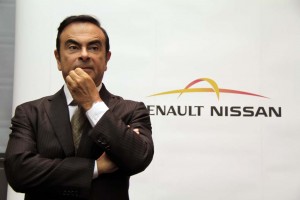There were plenty of skeptics when Nissan announced plans to put a high-volume battery-electric vehicle into production, more than a few automakers contending there would be no market for the green technology and predicting the Japanese automaker might as well throw its money down a well.
Today, while sales of battery-based vehicles have fallen short of proponents’ expectations, it’s hard to find any maker not working on electric propulsion, and several – notably including Volkswagen AG – have laid out plans to become the leaders in the emerging segment. But don’t tell that to Carlos Ghosn, the CEO of Nissan and its French alliance partner Renault. He said the Japanese makers has no intention of stepping aside for its competitors during a wide-ranging Q&A session with reporters at the Frankfurt Motor Show.
During that discussion, Ghosn expressed his cautious optimism that after tumbling to its lowest level in two decades, the European auto market is finally on the mend. He also explained why his well-respected second-in-command, Carlos Tavares, suddenly and unexpectedly left the French side of the alliance late last month.
“We came to agree it was in the best interest of this company if he left,” Ghosn explained, referring to the aftermath of an interview Tavares gave to the Bloomberg news service expressing his interest in possibly running General Motors or Ford Motor Co. “If that statement had not be made,” added Ghosn, Tavares “would still be sitting here as part of the team.”
(Tavares unexpectedly out as Ghosn’s top lieutenant. Click Here for the story.)
The Brazilian-born Ghosn has generally positioned himself as the mainstream auto industry’s most vocal proponent of electric propulsion. During his meeting with reporters, the executive admitted that sales will fall well short of the predicted 1.5 million battery cars by mid-decade. Nonetheless, Ghosn’s long-term optimism hasn’t changed.
“Yes, I think (demand for battery vehicles) is going to represent 10% of the market,” with the right level of support from governments in China, the U.S. and Europe, in particular, he asserted. In the U.S., all battery-based vehicles, including conventional hybrids, plug-ins and full battery-electric models like the Leaf currently account for around 4% and the figures aren’t any better in most markets, perhaps with the exception of Japan where the Toyota Prius is one of the nation’s best-selling vehicles overall.
(For a full round-up from the Frankfurt Motor Show, Click Here.)
Toyota has been, by far, the best-selling brand for hybrids, though it is openly skeptical about the short-term prospects of more advanced, lithium-ion-powered vehicles. Nonetheless, the Japanese giant isn’t ready to shed its halo for competitors like Nissan.
Meanwhile, with an assortment of new battery-based models, including an all-electric Golf hatchback, on display in Frankfurt, senior Volkswagen officials have been promising to take over the segment leadership.
Ghosn noted the competition – which he said is entirely predictable as the industry copes with stiff new mileage and emissions regulations around the world. But he made it clear Nissan has ambitions of its own. In fact, at a separate event the company recently sponsored, Nissan global product chief Andy Palmer backed that up by revealing the maker plans to have five full battery-electric models in showrooms by decade’s end, along with numerous hybrids and plug-ins, as well.
One of the markets where the industry hopes to generate strong demand for battery vehicles is in Europe – that is, when the market begins to recover after years of sharp sales declines and industry-wide losses running into the tens of billions of dollars.
“We can see the beginning of a turnaround,” said Ghosn, reflecting the sentiment of numerous industry leaders gathered in Frankfurt, “But we still don’t see growth.”
If anything, 2013 will likely end with about a 5% decline from prior-year sales for the European industry, Ghosn cautiously forecasting the numbers will rise by perhaps 1.5% in 2014 and only slowly gain momentum beyond that.
(With Europe showing signs of life, Ford prepping 25-product blitz. Click Here for details.)
The “key,” he said, is “when consumers regain confidence,” adding that it will take a shift in policy by European governments away from austerity measures in favor of encouraging growth again.
The good news, the Renault/Nissan CEO said, is that global car sales will almost certainly be pushing again towards a record likely to reach 83 million vehicles. With the exception of Japan, where consumers were hit recently by an increase in VAT taxes, Ghosn said most or all the world’s key markets, from China to the U.S. to Russia and Brazil, are “continuing to grow.”
“I think the worst is behind us,” he concluded, quickly adding that this “doesn’t mean we shouldn’t be cautious.”


Every major car maker is losing money on EVs but they are forced to try and sell them in the U.S. in an effort to reduce the EPA CAFE fines they will pay when they are unable to meet the mandated 54.5 mpg figure pulled out of Obama’s and the EPA’s orifice.
It’s not rocket science to understand the very limited practicality of EVs for city use only. Long term they may prove even more of a environmental problem dealing with the toxic batteries which will be piling up quickly as technology changes and the batteries fail quickly with heavy use in difficult ambient environments like high heat or very cold conditions.